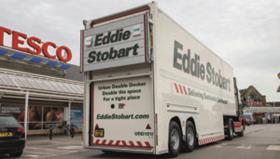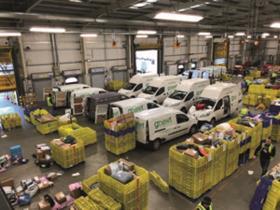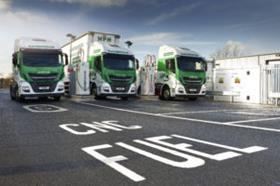
The 2018 Motor Transport Awards takes place next week, and sees four businesses shortlisted for the Low Carbon Award, sponsored by Fraikin. The winner will be announced at the Grosvenor House Hotel on Wednesday 4 July, in front of an audience of 1,500 people.


Eddie Stobart Logistics presented our judging panel with its holistic approach to improving the efficiency of its fleet and, in doing so, reducing its carbon footprint. This comprises partnership: the business works with partners including the FTA Logistics Carbon Reduction Scheme, Environmental Benchmark Forum and Wholesale Power to implement initiatives to save energy and fuel wherever possible. Fleet design and fuel usage: the haulier has looked at ways to reduce carbon emissions produced by its vehicles. This includes reducing the distance travelled by its fleet through route planning and optimisation of vehicle fill, reducing empty running, reducing fuel consumption by monitoring driver behaviour and ongoing driver training via its training academy and the Driver CPC scheme. Collaboration: working with Scania, Volvo and Mercedes-Benz has ensured the company is continually pushing ahead with the most appropriate sustainable solutions, as has maintaining a young fleet. Research and development: following a research project undertaken with Wirth Research, a test batch of 275 vehicles is on the road with a new design aimed at reducing drag to improve efficiency.
“A clear leader in sustainable logistics and impressive carbon savings being made,” was the view of one of our panel.

The business with the unusual name, Gnewt Cargo, continues to do things differently. The business is part of a two-year trial that is testing a set of innovative new vans – the Voltia (Nissan) and BD Auto e-Ducato – which have been added to its existing fleet of fully electric vehicles.
The trial vans’ emissions performance is being tested against comparable diesel delivery vans using Fleet Carma telemetry technology. They are larger than most light goods vehicles and have an expanded capacity, which means fewer vehicles are required for deliveries, causing less congestion on London’s roads. The trial is part of the Low Emission Freight and Logistics trial funded by the Office for Low Emission Vehicles (OLEV) in partnership with Innovate UK. It is also supported by LoCITY, which will provide technical expertise throughout the project.
“A great initiative to reduce truck numbers and emissions from central London,” said one of our judges.

H Parkinson Haulage might have a history stretching back sixty years but the firm is not stuck in the past. It detailed to our judges how it had applied the use of CNG fuels to a customer contract. The vehicles run finished tissue product from the manufacturing plant to an RDC 80 miles away. Each vehicle completes two round trips per day and are manned on a four on four off shift basis, and where payload allows, raw materials are delivered into the production facility on the same vehicles.
The vehicles will work on average 50 weeks per year 24/7 so the total mileage per vehicle will be in excess of 220,000 miles per annum – a massive opportunity to make a real and tangible reduction in emissions.
“Hugely impressive steps being made by a relatively small, family business. They have recognised the clear benefits of dedicated gas vehicles running on 100% biomethane, and are making good use of longer semi-trailer opportunities,” said one of our panel.

The big red cut to the chase in its award submission, noting Royal Mail has “a history of innovating, pioneering and leading the adoption of carbon-reducing vehicle technology”. The UK’s largest deployment of electric vehicles in the past five years; development of the first UK-designed and built electric truck (with Arrival); a carbon emission reduction programme across all sizes of commercial vehicles; and independent endorsements and awards for the firm’s environmental fleet initiatives, were the next salvo that hit our judges.
“Royal Mail has a long record of working to reduce its carbon footprint,” agreed one of our panel. “Its involvement with CPC and Dow Jones are indicators of how seriously Royal Mail approaches the task.”
Our panel liked the work across a swathe of the operation, from electric vehicles to double-deck and longer semi-trailers, right-sizing, modal shift from air to road and reduced empty running (all set against a 2004 baseline).
Royal Mail achieved its 20% carbon reduction by 2021 goal in the 2016/17 financial year. “This is an example of thought leadership and innovation beyond the norm,” said another judge.











